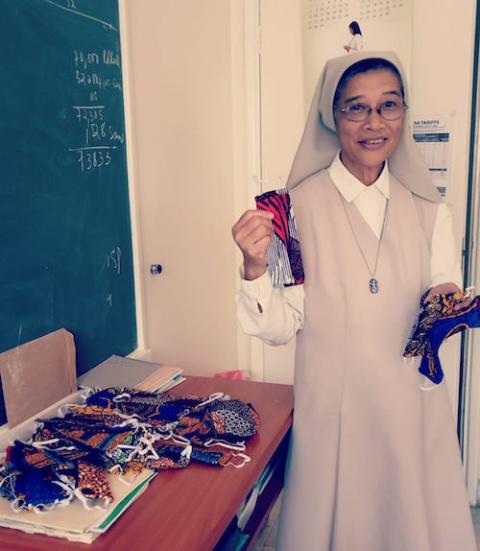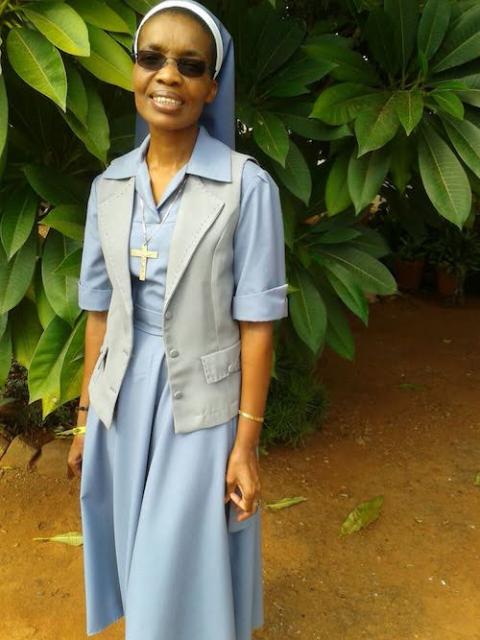
Sisters of the Daughters of Charity of St. Vincent De Paul in Nigeria make hand sanitizer for the needy during the COVID-19 pandemic. About 90 million people — roughly half Nigeria's population — live in extreme poverty, according to estimates from the World Data Lab's Poverty Clock. (Provided photo)
Seated on a narrow bench in her small wooden shack with her children in the middle of the Kibera slum, Linet Achieng has been struggling since the country confirmed its first case of coronavirus on March 12.
Her food kiosk was shutdown over COVID-19 outbreak concerns. Utility providers cut off her electricity and water over unpaid bills, and her husband lost his job as a waiter at a local bar; they couldn't pay their rent.
"Life is very difficult in the slum. People are not going to work, and some of us have lost businesses," said Achieng, a mother of five, who has lived in Africa's biggest slum for two decades. "We can't afford two consecutive meals a day. The government should work faster to end this pandemic."
Achieng and other hundreds of thousands of slum dwellers are facing another challenge. The Ministry of Health recently said it was mandatory for Kenyans to wash their hands or sanitize regularly and to wear masks whenever they are outside in public places.
Many poor Kenyans have little financial cushion against the negative economic impact of the virus, declared a pandemic by the World Health Organization.

Kiswahlii district of Kibera slum settlement outside of Nairobi, Kenya, undated photo (Wikimedia Commons/Kipala)
Most Kibera slum residents live in extreme poverty, earning less than $1 per day. The slum has more than1 million inhabitants who lack access to basic services like electricity, running water and medical care. Nearly all houses here are wooden shacks with a mud floor and a tin roof — no toilets or running water.
"I can't afford masks and gloves," said Achieng. Currently a single-use mask is retailing at 200 Kenyan shillings ($2). "We are going to bed hungry because we can't afford a meal. Where is money to buy masks, gloves, soap and sanitizer?"
Nevertheless, well-wishers are responding to the plight of Kibera residents. Religious sisters are among donors playing a major role in saving lives and reducing illness related to COVID-19.They have responded swiftly and delivered food, masks, sanitizers and water to the residents.
Sr. Pasilisa Namikoye, who is the secretary general of the Association of Sisterhoods of Kenya (AOSK), said religious nuns are distributing food and water to Kibera residents in partnership with Guadalupe and Sacred Heart parishes.
"We already had an outreach program in Kibera, and we were giving residents foodstuffs even before the outbreak of coronavirus," said Namikoye, a member of the Little Sisters of St. Francis congregation in Kenya. "But right now we have extended our support to more people because of the economic difficulties the poor are going through after many lost jobs and businesses."
Namikoye said that the Kenyan women religious association has reached out to hundreds of vulnerable people in the slum since the COVID-19 pandemic emerged, noting that they could do more if they get more funds.

Sr. Felly Covacha of the Carmelite Missionaries shows the reusable face masks made for people living in the Kibera slum in Kenya. The masks are made through a program she runs there called Help Girls Stay in School, which usually makes reusable sanitary pads for girls and young women. (Provided photo)
"We have reached out to many slum residents since the virus was confirmed in the country," she said. "We have distributed foodstuffs to the hungry, and we hope to continue doing so."
Sr. Felly Covacha, who has worked in the slum for almost a decade, is sensitizing residents on the measures to take to help stem the spread of the virus. Covacha is aware of the dangers COVID-19 poses, especially in a crowded neighborhood such as Kibera, which could be devastated should the outbreak overwhelm the already strained health care facilities.
The Carmelite nun, who runs a Days for Girls project called "Help Girls Stay in School" in the sprawling slum to make reusable sanitary pads for needy girls in schools, now uses her skills to make face masks to help stop the spread of the novel coronavirus.
"The people in Kibera would not be able to afford the disposable masks that are currently being sold commercially," said Covacha, noting that she makes about 300 face masks daily. "They hardly have food for the day. Our masks are reusable and this is our small contribution to stop the spread of coronavirus in the slum."
The East African nation has imposed a nationwide nighttime curfew from 7 p.m. to 5 a.m. every day, and closed schools, cafes, bars and entertainment venues. The country has also closed its border, suspended religious gatherings and encouraged people to work from home. Still, the Ministry of Health has raised the alarm over a surge in community transmissions as the number of cases rose to 607 as of May 7.
Governments across Africa have similarly imposed far-reaching restrictions in a bid to curb the spread of the virus, with experts warning that any restriction of movement must go along with a plan on how the poor will have access to basic items. There were more than more than 51,697 confirmed cases of coronavirus across the continent as of May 7, according to data compiled by Johns Hopkins University.
The United Nations has warned that the COVID-19 pandemic will drive more than a quarter of a billion people to the brink of starvation unless swift action is taken to provide food and humanitarian relief to the most affected regions.
"If we don't prepare and act now — to secure access, avoid funding shortfalls and disruptions to trade — we could be facing multiple famines of biblical proportions within a short few months," the head of the United Nations food agency warned on April 22 while speaking at an online briefing broadcast by the U.N. on YouTube, Facebook and Twitter.
In Botswana, where the government has imposed a nationwide lockdown for 28 days to slow the spread of COVID-19, sisters are working to ensure that the less fortunate do not go hungry. The landlocked country in southern Africa has 22 confirmed cases of the virus and one fatality.
Srs. Tshepo Sengwatse and Sylvia Mogampane, who are social workers, are currently assessing households in need of government sponsored food relief baskets during the lockdown. The intention is to help the members of the community who are in dire need as soon as possible, they said.
"We are moving door to door in villages and checking the number of people living in each household," said Mogampane, a member of the Sisters of Calvary. "We go deeper to see if there is a shortage of food, and if we find an emergency we give them food straight away. Others are registered and we supply them food once the assessment is complete."

Sr. Sylvia Mogampane, a member of the Sisters of Calvary in Botswana, works to feed the vulnerable during COVID-19 pandemic. (Provided photo)
Mogampane, also a member of the Sisters of Calvary, works for the government in Tlokweng village adjacent to the capital Gaborone. She said many people, especially the poor in villages, were suffering as a result of the lockdown. While Botswana has made strides in reducing poverty, it remains one of the world’s most unequal countries, according to a World Bank report.
"Most people in villages are starving because they depend on daily wages to eat. Some sell food at the bus park, but now there are no buses coming. Some are taxi drivers and some work in small shops, but the shops are now closed so these people are really finding it hard and these are the cases that we treat as emergencies," she said.
In addition to assessing households, Sengwatse said, they have also had to provide counseling to couples who are fighting and accusing each other for failing to provide for the family.
"When we go door to door, we meet different people — some are hungry, some are fighting so we have to listen to them and try and help them understand each other," said Sengwatse. "People here are not used to staying in one place. They are bored, stressed and keep asking when the lockdown will end."
Nigeria, which has had 3,145 cases and 103 deaths as of May 7 has ratcheted up efforts to contain the spread of the virus. The West African country has announced lockdown in several states including the commercial capital Lagos.
Advertisement

Sisters of the Daughters of Charity of St. Vincent De Paul in Nigeria prepare food to distribute to people. (Provided photo)
Since the lockdown began, it's been challenging for the needy in a country where more than 100 million out of 200 million people live in poverty. The government announced it would distribute food to 3.6 million poor Nigerians to sustain them during the lockdown. There have been no reports on how many have actually received food or are still waiting for assistance.
Various congregations of sisters have been helping the needy during the COVID-19 pandemic. Sr. Theresa Eke, the provincial superior of the Daughters of Charity of St. Vincent De Paul in Nigeria, directed sisters in her congregation a few weeks ago to feed the hungry.
She said the congregation received financial donations from individuals and also took money from bank accounts to buy food items for the needy.
"We have shared 40 bags of rice, 40 cartons of noodles, 10 bags of beans, five bags of garri [cassava flakes] and condiments to the poor," said Eke, noting that the distributions are done while maintaining social distance and assuring them of their prayers. "We have also produced and distributed 3,000 face masks and 200 bottles of hand sanitizer to the needy."
The sisters of the Medical Missionary of Mary, a congregation of sisters that provides free surgery for fistula patients in southern Nigeria, are also helping the needy by giving them food items and sensitizing the people on measures to take to avoid being infected with the disease.
"We have roughly 20 people living with us in the Family Life Center hospital here," said Sr. Sylvia Ndubuaku, the matron of the center. "They totally depend on us. So we are feeding them. We are also providing them with vitamin C tablets to boost their immune system due to COVID-19. The sisters are also distributing food items to various villages."
Back in the Kibera slum, residents are urging the government to suspend payment of taxes, rent, and water and power bills to allow them fight the virus without worrying about maintaining a roof over their head.
"This is the time the government should offer poor Kenyans economic reprieve," said Achieng. "If they abandon us, we will die with our children."

A nun from the Daughters of Charity of St. Vincent De Paul in Nigeria sews face masks to be shared with the needy to keep themselves from spreading COVID-19. (Provided photo)
[Doreen Ajiambo is the Africa/Middle East correspondent for Global Sisters Report based in Kenya. Follow her on Twitter: @DoreenAjiambo. Contributing to this story were Rumbi Chakamba in Southern Africa, Lourine Oluochin in Kenya, and Kelechukwu Iruoma in Nigeria.]





